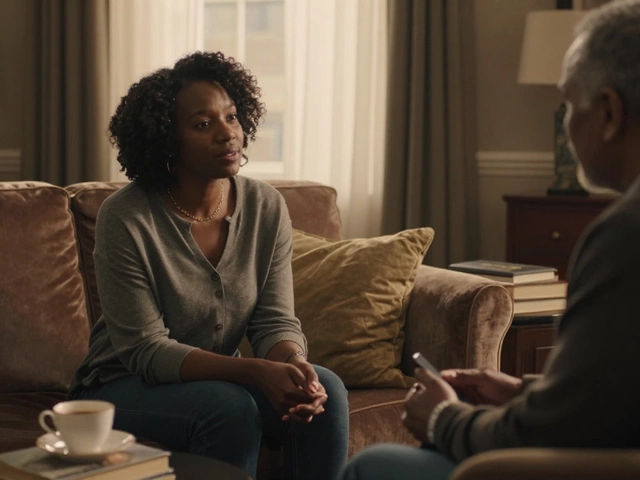Prunella Scales, the legendary British actress whose razor-sharp portrayal of Sybil Fawlty in BBC’s Fawlty Towers made her a household name across the English-speaking world, died on in London at age 93. Her family confirmed she was watching Fawlty Towers—the very show that defined her career—when she passed away. It’s the kind of poetic end that feels almost scripted, as if the character she brought to life one last time, in silence and solitude, was the final curtain call she never knew she was rehearsing.
The Woman Behind the Snarl
Born Prunella Margaret Rumney Illingworth on in Sutton Abinger, Surrey, Scales came from a family steeped in British theatrical tradition. Her mother, Catherine "Bim" Illingworth, was a stage actress trained at the Royal Academy of Dramatic Arts, and her father served in both World Wars. By age 17, Scales had earned a scholarship to the Old Vic Theatre School—a rare path for a girl from the English countryside at the time. She chose acting over Oxbridge, a decision that would alter the course of British television. Her early career was marked by classical roles, but it was John Cleese’s 1975 creation that turned her into an icon. As Sybil Fawlty, the imperious, acid-tongued wife of Basil Fawlty, Scales didn’t just play a character—she invented a archetype. Sybil wasn’t just loud or controlling; she was the embodiment of class anxiety, brittle authority, and darkly comic entitlement. The show’s twelve episodes, filmed at the Gleneagles Hotel in Torquay, became a cultural touchstone. Even today, reruns air on BBC in over 40 countries.A Life Beyond Sybil
Though Sybil Fawlty overshadowed much of her later work, Scales never stopped acting. In 1991, she earned a British Academy Television Award nomination for her chilling portrayal of Queen Elizabeth II in Alan Bennett’s A Question of Attribution, a BBC drama exploring the secret life of royal art historian Anthony Blunt. Her performance was quiet, devastating—a monarch caught between duty and deception. Her marriage to actor Timothy West in 1963 became one of British theatre’s most enduring partnerships. For five seasons between 2014 and 2019, the couple co-hosted Great Canal Journeys for Channel 4 Television Corporation, traveling narrowboats along the UK’s forgotten waterways. Viewers loved watching them bicker over maps, argue about tea temperatures, and admire the quiet beauty of rural England. It was a gentle, aging counterpoint to the chaos of Fawlty Towers—and a reminder that Scales could be warm, witty, and deeply human.Why Her Legacy Endures
What Comes Next
No funeral arrangements or public memorial have been announced. The family has asked for privacy, but fans are already gathering online to share clips of Sybil’s most iconic moments—her tirades, her haughty silences, the way she’d hold a wine glass like a weapon. A tribute from the British Academy of Film and Television Arts is expected in the coming weeks. The BBC has not yet confirmed whether it will re-air the full series, but industry insiders say it’s inevitable. In the meantime, the final image of Scales—watching her own masterpiece, alone, in her London home—is one that will linger longer than any award.Frequently Asked Questions
How did Prunella Scales’ role as Sybil Fawlty influence British comedy?
Scales’ Sybil Fawlty redefined the comic wife trope by blending aristocratic haughtiness with explosive volatility. Unlike earlier sitcom wives who were merely nagging or bumbling, Sybil was terrifyingly competent—her insults were precise, her control absolute. This complexity influenced later characters like Margaret Thatcher’s fictionalized portrayals and even Succession’s Logan Roy’s wife. Her performance showed that comedy could be sharp, psychological, and rooted in real social tension.
Why was Fawlty Towers only 12 episodes long?
Creator John Cleese deliberately limited the series to two seasons (six episodes each) to preserve its quality. He feared overexposure would dilute the humor. The show’s brevity only amplified its impact—each episode was meticulously written, often rewritten, and rarely repeated. The result? A legacy that outlived most 200-episode sitcoms. It remains the most awarded British comedy in history per capita.
What was Prunella Scales’ relationship with Timothy West like off-screen?
Their 62-year marriage was one of British theatre’s most enduring partnerships. They appeared together in over a dozen stage productions and shared a quiet, mutual respect. In Great Canal Journeys, their playful bickering mirrored their real-life dynamic—she was the planner, he was the romantic. Friends described them as "two old actors who still found wonder in each other’s company." Their bond made their on-screen chemistry in Fawlty Towers all the more remarkable.
Did Prunella Scales ever express regret about being typecast as Sybil Fawlty?
No. In interviews, she often joked that Sybil was "the gift that kept on giving." She embraced the role’s fame, even signing autographs with "Sybil Fawlty" instead of her own name. But she also worked steadily in theatre, radio, and film, proving her range. Her BAFTA-nominated turn as Queen Elizabeth II in 1991 was a deliberate pivot—and a masterclass in restraint.
What impact will her death have on British television archives?
Her passing is likely to trigger a surge in archival interest. The BBC holds the master tapes of Fawlty Towers, and the British Film Institute already has extensive footage of her stage work. Expect restored editions, new documentaries, and possibly a posthumous tribute at next year’s BAFTAs. Her work is now officially part of Britain’s cultural heritage.
Is there any truth to the story that she watched Fawlty Towers at the time of her death?
Yes—her family confirmed it in a statement released to multiple UK media outlets, including the BBC and The Guardian. While no official cause of death was given, the detail was included as a tribute. It’s a rare, intimate window into how an artist sees their own legacy: not as a performance, but as a companion. She didn’t just play Sybil. She lived with her.



